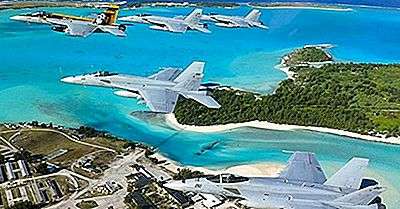This unincorporated American territory is a strategically important island atoll in the Western Pacific Ocean, claimed by the United States on January 17, 1899. The island is not integrated and is distinguished from other Pacific islands by a distance of 592 from its nearest neighbor, Utirik Atoll, which is part of the Marshall Islands. Wake Island is actually made up of three islets. Namely, these are Wake, Wilkes and Peale. These three islets are positioned around a lagoon. The atoll covers less than three square kilometers and is located in the central Pacific. The island was named after Captain Samuel Wake of the British merchants who visited the island in 1796.
Historical role
Wake Island has been discovered and rediscovered several times since its first landing in 1568 by the Spanish explorer Alvaro de Mendana de Neyra. Wake Island was located on the galleon road between Acapulco, Mexico and Manila, Philippines, so it was impossible to miss it. The Bremen bubble level ship was grounded on the eastern reef of the island on the night of March 4th, 1866. The ship was sailing from San Francisco to Hong Kong when it sank in the atoll. From that day, many ships will dock near the atoll and make efforts to recover the precious spirit level . Some were able to recover precious stones and coins, but one or two others were wrecked and their members
Modern significance
In 1898, the United States annexed Hawaii, Guam, and the Philippines as potential states or territories. The United States was looking for a Pacific refueling stop for their naval vessels and decided that the Isle of Wale was perfectly located for this purpose. President William Mckinley ordered the commander of the United States Navy, Edward Taussig, on the 17th, 1899, to claim the island for the United States. Some incidents followed after a US Navy ship, captain by Alfred Croskey, investigated the island when they saw Japanese occupying the island. The Japanese government has declared that it does not claim any rights on the island and that the men are on the island in search of guano and fish
Habitat and biodiversity
The habitats of Wake Island and its three islets are limited to shrubs, the topography typical of tropical islands and the interior reef lagoon, as well as the surrounding coral reef. The island and islets are inhabited by birds such as sanderlings, terns, white-tailed tropics, boobies, frigates, puffins, tourniquets, curlews, rods, albatrosses, legs and noddies . Green turtles and skinks can also be found in the islets. There is also a rare type of herb, lepturus gasparricensis. which is endemic to the island. Reef fish species include humpback parrots, napoleons and groupers. Other marine fish also occupy a niche in the coral reef. This coral atoll includes 52 species of coral in and around the lagoon.
Environmental threats and territorial disputes
The United States did not constitute and organize Wake Island and, as such, many government services are lacking. Conservation efforts by wildlife personnel have been largely ineffective, and populations of parrotfish and wrasse have declined considerably, both listed as “vulnerable” species. Once a prosperous population, the Wake Rails, which once lived on the island, are now gone due to the Japanese hunting for food during World War II. The island was the scene of a battle between Japanese and American soldiers during the second world war, after the Japanese launched two attacks on the island. On December 12, 23rd, 1941, they occupied the Island and detained American soldiers until their surrender in 1945 to the American forces. Today, the Marshall Islands still has a disputed claim regarding Wake Island.
